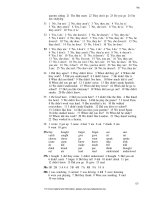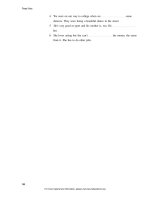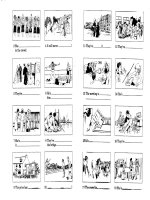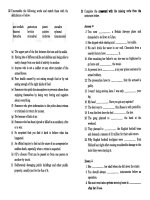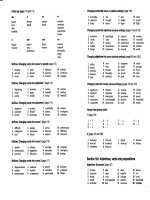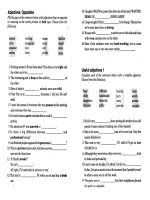new grammar practice pre int with key phần 7 potx
Bạn đang xem bản rút gọn của tài liệu. Xem và tải ngay bản đầy đủ của tài liệu tại đây (96.21 KB, 18 trang )
Gerunds and infinitives
69 Prepositions + gerund
• When a verb follows an preposition, it takes the gerund:
We thought about leaving early.
1 was worried about getting home.
I'm interested in hearing more about your offer.
I'm tired of hearing Ids excuses.
After closing the door, he looked up and down the street.
Check your passport before leaving.
NOTES
• Note That to can be a preposition, or part of an infinitive:
/ decided to leave early, {to + infinitive)
I'm looking forward to seeing them again, [to + gerund)
• A gerund behaves like a noun. Where a gerund can be used, a noun can also be used.
I'm looking forward to going on holiday.
I'm looking fonvard to my holiday.
Practice
Complete these sentences, putting the verbs into the gerund and using one of the
following prepositions. Some of them are used more than once.
about of in to after
by for on at without
1 We talked about going_ (go) to France for our holiday.
2 I look forward (see) you again next year.
3 She's tired (work) for the company.
4 I'm very happy my parents
(come) home.
5 (open) the front door, I walked slowly through it.
6 We got into the house (climb) through
a window.
7 I'm looking forward (work) with you.
8 Are you interested (join) the committee?
9 I'm tired (come) to the same place every week.
10 He's very keen (swim) at the moment.
11 I'm worried Jane (get]
to the airport on time.
12 I'm not interested (hear) your excuses.
13 She's very good (listen) to what people say.
14 This is used (cut) metal.
15 The car drove off (stop).
98
Gerunds and infinitives
70 Gerunds as subjects of sentences
• Gerunds can be subjects of sentences (or objects > Exercise 67):
Smoking makes me feel sick.
Living in a foreign country can be very difficult.
Practice
Rewrite these sentences, starting with a gerund. You may need to change
some words.
1 A good way of keeping fit is to swim every day.
Swimming every day is a good way of keeping fit.
2 It takes a long time to learn a foreign language.
3 Clean the machine more often - that will solve your problems.
4 Grow your own food. It's less expensive.
5 Give up smoking: it will make you feel better.
6 It is cheaper to go by rail than by air.
7 You are not allowed to smoke here.
8 It's not very pleasant to be in hospital.
9 It's very difficult to windsurf properly.
10 It's more difficult to speak a foreign language than to read it.
11 It is forbidden to walk on the grass.
12 One thing I can't do is swim on my back.
13 It's difficult to be polite to someone you don't like.
99
Gerunds and infinitives
71 Gerunds
Check
have
move
watch
learn
study
get up
hdp
look after
smoke
say
eat
become
work
go
write
walk
live
make
see
go out
Write the verbs in the box in the correct form in these sentences. Use each verb
once only.
1 Smoking is unhealthy, but a lot of people find it difficult to stop.
2 I'm fed up with in the city - it's too dirty
and crowded.
3 1 enjoy in the garden at weekends.
4 I have decided to stop in the evenings so that I
can save some money for my holidays.
5 He's an artistic person - very good at poetry.
6 They don't like and go everywhere by car.
7 I'm not really interested in to university.
8 She's going to continue for another two years,
until her exams.
9 They're thinking of house.
10 That machine? Oh, it's used for toasted sandwiches.
11 They've given up meat.
12 Before a teacher, he worked in advertising.
13 children can be very tiring.
14 We're looking forward to you.
15 They hate early in the morning.
16 Thank you for me organize the party.
17 They're very keen on how to play chess.
18 We love parties.
19 She left without goodbye.
20 television seems to be our national sport.
100
Gerunds and infinitives
THE INFINITIVE
FORM
• Depending on the construction, infinitives are used with or without to:
It's time to go.
Did you. see the accident happen?
72 to + infinitive after certain verbs
• Certain verbs take the infinitive.
/ want to stay.
We decided to wait for the bus.
Note the negative:
We decided not to wait for the bus.
Practice
Complete the sentences, using a verb from the box. Use each verb once.
help
speak
buy
get on
stay
look after
find
telephone
go out
1 We decided .to go. to Spain for our holidays.
2 She learnt Arabic when she was a child.
3 I tried you but there was no answer.
4 They refused the plane.
5 She hopes a job soon.
6 Did you forget the bread?
7 I'm tired: I don't want tonight.
8 They offered the children for the evening.
9 They're planning with us for the weekend.
10 He agreed us with our problem.
101
Gerunds and infinitives
73 to + infinitive to express purpose
• to + infinitive is used to express purpose:
I came here to see you.
I went to London to study English.
I drove to the airport to meet my parents.
Practice
Express each question and answer as one sentence, using to + infinitive.
Note that you will need to change some words.
1 Q: Why do you go to the beach every weekend? -
A: Because I like swimming.
She goes to the beach every weekend to swim.
2 Q: Why did you move to London?
A: I wanted to find work.
He
3 Q: Why are you leaving home?
A: I'm going to university in Birmingham.
She
4 Q: Why are you having a party?
A: It's my thirtieth birthday, and I want to celebrate it.
He
5 Q; Why do you get up at six every morning?
A: I do my training then.
She
6 Q: Why are you going out?
A: I want to post a card to my mother.
He
7 Q: Why are you saving money?
A: We want to buy a car.
They
102
Gerunds and infinitives
8 Q: Why are you going to Egypt?
A: We want to visit Ali's parents.
They
9 Q: Why did you buy a new suit?
A: 1 want to wear it at the office party.
He
10 Q: Why did you buy a video recorder?
A: We want to record the World Cup Final.
They
74 in order to + infinitive, so as to + infinitive to express purpose
In order to + infinitive and so as to + infinitive are also used to
express purpose.
• in order to + infinitive, can be more formal than to + infinitive:
In order to qualify for the award, you should be under twenty-five.
• in order to + infinitive and so as to + infinitive are more common than to +
infinitive before verbs like be, have, and know:
I got up early so as to be ready for John's phone call
• To express a negative purpose, in order not to + infinitive and so as not to
+ infinitive are more common than not to + infinitive:
He opened the door quietly so as not to disturb the baby.
Practice
Rewrite these sentences without changing their meaning, using the words in
brackets. You will need to omit some words, and you may need to change the
word order.
1 She put the letter in her bag because she didn't want to lose it. (so as)
5he put the letter in her bag so as not to lose it.
2 You should book your tickets early if you want to avoid disappointment.
{in order to}
You should book your tickets early in order to avoid disappointment.
3 I'll leave work at 4.30 so I won't be late, (so as)
4 Everybody stopped talking because they wanted to hear her sing.
103
Gerunds and infinitives
(in order)
5 I need to watch you so T can understand what you are doing on the
computer, (in order)
6 If you want to pass the exam, you will need to study very hard, (in
order)
7 We don't want to waste any time, so let's start the meeting now. (so as)
8 They moved out of the city because they wanted to have a quieter life,
(in order)
9 Keep the CD in its case. Then you won't damage it. (so as)
10 He waited outside the house because he wauled to see her when she
came home, (so as)
104
Reported speech
There are two ways of reporting what a person says:
Direct speech
He said, 'I'm going home.'
'I'm going home,' he said.
Indirect speech
He says he's going home.
He said he was going home.
DIRECT SPEECH
75 Writing direct speech
She said, 'My name's Stella.
'My name's Stella,' she said.
• Direct speech reports the exact words the speaker says. Put quotation marks
(' ') before and after the speaker's statement.
Notes
The speaker's statement always starts with a capital letter.
she said can go heforc or after the statement, but is separated from it by a comma (J.
Commas and full stops after the statement go inside the quotation marks.
Question marks go inside the quotation marks.
Question marks are not followed by a comma:
are you?' she said.
105
Reported speech
Practice
75a Put the sentences below into direct speech, using the words given.
1 the bus driver
The bus driver said, 'We're late.'
2 the little boy
3 Jane
5 the old man
106
4 the policeman
6 the teacher
Reported speech
9 the guard
10 the receptionist
107
7 she
8 he
Reported speech
75b Write the sentences below using direct speech. Write each sentence twice,
putting she said, he said, etc. before and after the statement.
1
Don't be late home.
My parents said. 'Don't be late home.
'Don't be late home,' my parents said.
I'd like to go
out tonight.
He said, I'd like to go out tonight.
I'd like to go out tonight,' he said.
Go home and
stay in bed.
The teacher
The doctor
We're coming to
visit you on Sunday.
Ruth
The courses cost
£100 per week.
The receptionist
They
1 want to come
with you.
Danny
Read this book
before next week.
We had a lovely time.
108
2
3
4
5
6
7
8
Reported speech
76 say, tell
You're on the
wrong train.
Can you answer
the door?
The ticket inspector
My grandmother
CONTRAST
• tell has a personal direct object (e.g. me, hint, her, etc. >- Exercise 79)
She told me she was going to be late.
'It's too late,' she told me.
{We cannot say: Ha told the weather was nice.)
tell is not used before questions. {We cannot say: He told me, 'Have wo
met before?')
say never has a personal direct object:
She said she was going to he late.
'It's too late,' she said.
The indirect object {to me, to her, to us, etc. Exercise 79} is used instead.
7 don't like them veiy much,' she said to me quietly.
Why did he say that to you?
There are a few special phrases in which tell does not have to take a
personal direct object:
tell the truth
tell a lie
tell lies
tell the time
tell a story
Practice
76a Use the correct form of say or tell in these sentences.
1 She told me she didn't agree.
2 '1 think I've met you before,' he said
3 I them I wasn't happy with their work.
4 She me a story about her parents.
5 He , 'Are you feeling OK?'
6 She smiled, and to me, 'I'm very pleased to meet you.'
109
9
10
Reported speech
7 I didn't hear: what did she ?
8 Could you me the time, please?
9 They me they were going to a meeting.
10 T the policeman my address.
11 I I wanted to buy a magazine.
12 He he wasn't interested in politics.
13 Could you me your name again, please?
14 Do you think he's the truth?
15 Would you them to come early tomorrow?
16 If he that again, there'll be trouble.
17 1 them it was dangerous to swim there.
18 Did you anything to him about your problems at work?
19 me what happened.
20 1 think he's lies.
76b Circle the correct verb, say or tell, in each sentence.
1 They [say/tell) that they're going to London to see Frank.
2 Mark (said/told) us all about his holiday in Jamaica.
3 Did you (say/tell) Sally is coming with us?
4 The teacher [said/told] the class a funny story.
5 'Don't [say/tell) lies!' [said/told) James angrily.
6 How old were you when you learned to [say/tell) the time?
7 1 can't understand what they're {saying/telling) to each other.
8 I hate speaking in public. I never know what to [say/tell).
9 Jane always [says/tells] me her secrets.
10 'Do you think anyone saw us?' she [said/told] nervously.
110
Reported speech
INDIRECT SPEECH
77 Reported statements with no change of tense
• When the reporting verb is present, present perfect, or future, there
is no change of tense in the reported statement:
= He says he isn't going.
= He'll say he isn't going.
= He's said he isn't going.
Note: that can be used after the main verb. The use of that is optional:
He says that he isn't going,
He says he isn't going.
Practice
Write these sentences in indirect speech, using the words given. Remember to
change the pronouns where necessary.
1 'I haven't done my homework.' (she says)
She eays she hasn't done her homework.
2 'I haven't got any money.' (He'll tell you)
He'll tell you he hasn't got any money.
3 'I've seen the film before." (she says)
4 'I want to go home.' (he's already told you)
5 'T haven't seen my mother for years.' (he says)
6 'I don't know how much it costs.' (she says)
7 '1 don't like going to parties.' (she's told me)
8 'We've never been to Berlin.' (they say)
9 'I need the money to visit my parents.' (he'll say)
111
Reported speech
10 We can't come on Tuesday.' (they've told me)
11 'I'm going to visit Europe this year' (the President will announce that)
12 'I can't stand classical music' (Gemma tells me)
13 'The plane will land in half and hour.' (the pilot has just announced that)
14 'There are no tickets left for tonight's performance.' (the booking office
says that)
15 'We haven't had anything to eat.' (the children say)
16 'I've already seen the play.' (he's told me)
17 'I'll come again next year.' (I've told them)
18 'I'm not feeling very well.' (Simon says)
19 'I've never been to Japan.' (Jason has just said)
20 'I'm meeting the students for lunch next week.' (she'll tell you)
21 'You'll never drive a better car.' (the advertisement claims that)
112
Reported speech
78 Reported statements with a change of tense
• When the main verb of the sentence is in the past tense, the tense in the
reported statement is changed:
= He said he wasn't going.
He said that he wasn't going.
-= She said her name was Stella.
She said that her name was Stella.
FORM
Speaker's words Reported statement
present simple —* past simple
present continaous —> past continuous
Practice
Write these sentences in indirect speech, using the words given. Change the
pronouns where necessary.
1 'My name's Ian.' (he said)
He said hie name was Ian.
2 'I'm writing a letter.' (she said)
She said she was writing a letter.
3 'I'm waiting for Jessie.
1
(she said)
4 'I don't like the idea.' (he said)
5 'The car isn't at my house.
1
(she said)
6 'The washing machine's broken.' (he said)
7 'I'm working.' (he said)
8 'We're worried about Peter.' (they said)
113
Reported speech
9 'I don't smoke.
1
[Megan said)
10 'I'm waiting for my exam results.' (John said)
11 'I work for an American company.' [Mrs Johnson said)
12 'I feel ill: (the little boy said)
13 'I'm watching television.' (Fiona said)
14 'I like the new house.' (Sam said)
15 'I'm washing the car." (Chloe saidj
114
Sentence structure
WORD ORDER
79 Direct object and indirect object
• In simple sentences the object is easy to see:
She hit him.
They took the money.
• Some verbs, however, have two objects:
She gave me the book. ( = she gave the book to me)
the book is the real object of this sentence. It tells us what she gave.
This is the direct object (D.O.)
me is the indirect object (l.O.)
FORM
• verb + direct object + to or for + indirect object:
Give
Buy
D.O.
the money
a present
to
for
l.O.
him.
your mother.
a) Some common verbs Taking to: bring, give, lend, pay, promise, send,
show, take, tell.
b) Some common verbs taking for: buy, find, get, make.
verb + indirect object without to or for + direct object:
Give
Buy
l.O.
him
your mother
D.O.
the money.
a present.
Note: that it is not possible to use the second form when the direct object is a pronoun
(me, her, him, it, etc]. The longer construction must be used:
Give it to John. (NOT Give John it.)
Practice
79a Rewrite these sentences without using to or for.
1 Give this food to your parents.
Give your parents this food.
2 Get an ashtray for me, please.
Get me an ashtray, please.
3 Have you sent a postcard to your family?
4 Did you pay the money to him?


